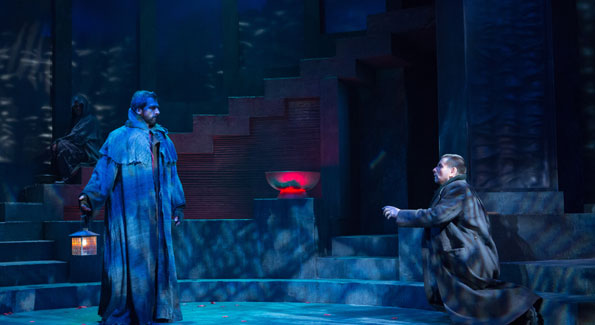REVIEW: Folger’s ‘Julius Caesar’ a provocative retelling of infamous political assassination.

The Ghost of Caesar (Michael Sharon, left) tells Brutus (Anthony Cochrane) “Thou shalt see me at Philippi” in ‘Julius Caesar’ (Photo by Teresa Wood)
There is no escaping the dark and sinister aura of conspiracy and assassination from the moment you take your seats at the haunting production of “Julius Caesar” at the Folger Theatre. The set has the stark patina of brushed metal columns punctuated by gray hooded figures moaning and moving slowly about like damned souls in a Greek chorus.
Tony Cisek’s eerie set and Mariah Hale’s melancholy costumes set the mood for what is coming — one of the most famous assassinations of a public figure in history, a provocative murder that set off a civil war and brought chaos to Rome. The sinister plot has reverberated down through the millennia, made inescapable by William Shakespeare and legions of high school English teachers.
It may be all-too familiar, but under the innovative direction of Robert Richmond, this “Julius Caesar” is provocative and memorable. Richard has staged a cast that moves in concert with the dark, but never distracting technical elements, highlighted by Jim Hunter’s moody lighting design and Eric Shimelonis’ chilling music composition and thumping sound design.
“Julius Caesar” is one of Shakespeare’s most accessible tragedies.
A group of conspirators, led by that lean and hungry Cassius, played with unctuous effectiveness by Louis Butelli, plan to kill Caesar but realize they cannot succeed without convincing Brutus to be part of the plot.
Brutus comes from a powerful Roman family responsible for the establishment of the Roman republic. The conspirators convince Brutus that Caesar has become too popular with the people and is a threat to the existence of the republic by raising the specter of creating a monarchy, an argument that can sway Brutus to act against a man he loves.
It does seem, however, that the noble Brutus is too easily convinced to join the traitorous conspiracy. Anthony Cochrane’s Brutus dominates the action, wrestling with the knowledge that he will act against a man he venerates, and convincing himself that what must be done will be done for Rome. The title of the play may be “Julius Caesar,” but Brutus is the heart of this drama and Cochrane’s interpretation of his role conveys an understanding of the painful ambiguity he must walk.
Brutus renders the final dagger blow with Caesar looking up at him with the terrible realization of his friend’s betrayal, and utters the immortal line: “Et Tu Brute.” Caesar died from 23 stab wounds.
Michael Sharon’s interpretation of Caesar is unsympathetic. His Caesar is a bit vapid, a man who was a hero of Rome, but who was indeed ambitious; even though he refused the crown that Marc Antony offered three times, it was evident he would accept it.
Caesar’s death offers Antony the opportunity to give the funeral oration — subtle and cynical — cleverly condemning the honorable men who assassinated Caesar, ending with the dramatic gesture of showing the throng Caesar’s bloody clothing.
It provokes a destructive civil war that ends at Phillippi where a defeated Cassius and Brutus commit suicide. Octavian eventually becomes Augustus, Rome’s first emperor.
Folger’s “Julius Caesar” is Shakespeare’s understanding of ambition and flattery and an awareness that friendship and love are often empty emotional words when absolute power is beckoning.
Under Richmond’s direction, the Folger production is spare and focused, and the haunting reality of betrayal and assassination is an indelible, hard universal truth.
“Julias Caesar” continues through December 7, 2014 at Folger Theatre, 201 East Capitol Street SE. Tickets are $40-$75 and available at 202-544-7077 and online here.
